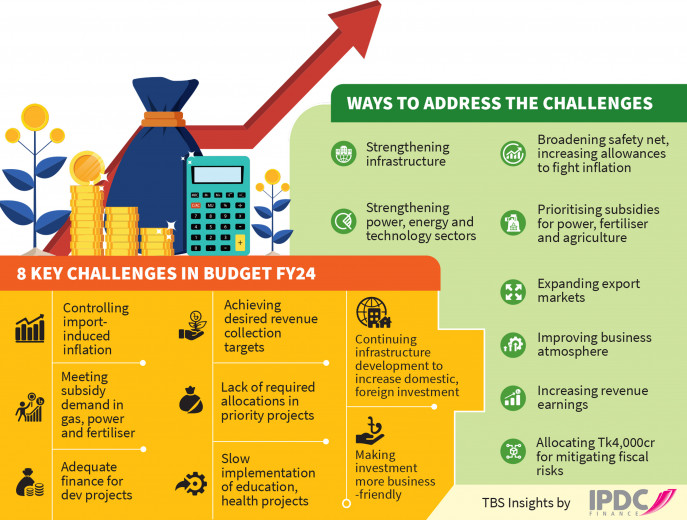While challenges like tackling “imported” inflation and boosting revenue earnings persist, funding priority projects to spur investment and growth emerges as a new concern for the next fiscal year beginning on 1 July, according to a Finance Division document.
Meeting escalating subsidy demand is also among the key eight challenges identified by the Finance Division in the budget summary for fiscal 2023-24 prepared for the Cabinet, sources at the division told The Business Standard.
Additionally, the slow implementation of education and health sector projects poses further obstacles.
These challenges and possible ways out will be incorporated in the budget documents to be presented in parliament by Finance Minister AHM Mustafa Kamal on 1 June.
The summary titled “2023-24 Fiscal Year Budget and Appropriation Bill, 2023 Approval” also highlights achieving the desired revenue collection target as one of the foremost challenges for next year.
Furthermore, the Finance Division acknowledges the difficulties in sustaining infrastructure reforms to attract domestic and foreign investments, as well as accelerating the post-Covid economic recovery process by fostering a more business-friendly investment environment.

Some of the challenges are the same as identified for the outgoing fiscal year, and most others are new. Controlling import-induced inflation, boosting revenues, widening social safety net and higher subsidy spending for pricier fuel oil, gas and fertiliser were among the key challenges identified for the outgoing fiscal year. As inflation surged, revenue growth slower than expected and subsidy requirements surpassed the current year’s allocations, these remain among the key challenges for the next fiscal as well.
Deferring low-priority projects was a key challenge for the current fiscal year, but insufficient allocations for priority projects have been seen as a major challenge for the next fiscal year that sees big infrastructures as a catalyst for big investments. Although widening of the social safety net is a priority for the current fiscal year, it remains the same for the next fiscal year as people are hard-pressed by soaring inflation.
Strengthening infrastructure, improving power, energy and technology sectors, expanding export markets and improving business atmosphere have been listed among key challenges for the next fiscal year to spur economic growth.
On 1 June, Finance Minister AHM Mustafa Kamal is set to present a budget proposal of Tk7,61,785 crore for the fiscal year 2023-24 in the Jatiya Sangsad, following the summary’s approval in the cabinet meeting chaired by the prime minister. This will mark the fifth budget during Prime Minister Sheikh Hasina’s present tenure.
Source: The Business Standard

